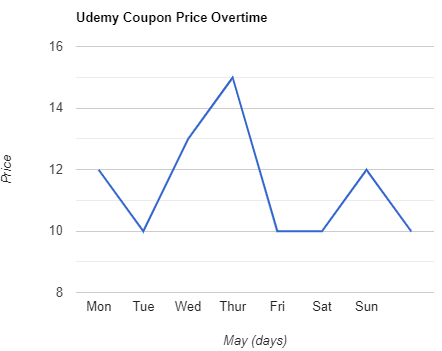70-461 Session 5: Querying Microsoft SQL Server (write SQL) (Udemy.com)
Using SQL, create analytical functions, grouping sets, ranking functions, spatial aggregates. SQL Server 12-17 (70-761)
Created by: Phillip Burton
Produced in 2018
 What you will learn
What you will learn
- Apply the ranking functions ROW_NUMBER, RANK, DENSE_RANK and NTILE
- Use the analytic functions new to SQL Server 2012, such as LAG, LEAD, FIRST_VALUE and LAST_VALUE
- Use different ways to group, such as ROLLUP, CUBE, GROUPING SETS, and related functions such as GROUPING_ID.
- Understand the geography and geometry data types, add points, line, polygons and circles, query these tables, find where lines and shapes intersect, and aggregate them.
 Quality Score
Quality Score
Overall Score : 86 / 100
 Live Chat with CourseDuck's Co-Founder for Help
Live Chat with CourseDuck's Co-Founder for Help
 Course Description
Course Description
If you are not, don't buy this course. Instead, please look at my 70-461 Session 1-7: Querying Microsoft SQL Server (SQL code) course instead, which includes this course and 6 other courses.
This course is the foundation for the Microsoft Certificate 70-461: "Querying Microsoft SQL Server 2012".
In Sessions 1 and 2, we learned all about dates, strings and number data types and DML statements. In sessions 3 and 4, we created views, procedures, triggers, constraints and combining datasets.
We'll will now be creating aggregate queries, working through objective 9 of the exam 70-461. We'll be reviewing the ranking functions ROW_NUMBER, RANK, DENSE_RANK and NTILE. We'll look at the 8 analytic functions news to SQL Server 2012, such as LAG, LEAD, FIRST_VALUE and LAST_VALUE.
We'll look at alternative ways of grouping and adding totals, using ROLLUP, CUBE, GROUPING SETS and GROUPING_ID. We'll also look at the geometry and geography data types, plotting locations on a grid, together with functions and aggregates.
No prior knowledge other than what we covered in Sessions 1 to 4 is required. This course builds on the knowledge previously gained in those previous sessions.
There are regular quizzes to help you remember the information.
Once finished, you will know what how to write ranking functions, analytic functions, grouping sets and spatial aggregates, and we'll have expanded on our current knowledge of T-SQL.Who this course is for:
- This course is for you if want a refresher course in SQL, or are learning SQL for the first time.
- This course is for you if you are working towards the requirements for exam 70-461, or if you just want to expand your knowledge of T-SQL.
- If you are starting from the beginning, then you should look at my sessions 1 to 4 courses before taking this session 5.
- If you want more advanced topics, then please look at my later sessions.
 Instructor Details
Instructor Details

- 4.3 Rating
 23 Reviews
23 Reviews
Phillip Burton
Phillip is a Computing Consultant providing expert services in the development of computer systems and data analysis. He is a Microsoft Certified Technology Specialist. He has also been certified as a Microsoft Certified Solutions Expert for Business Intelligence, Microsoft Office 2010 Master, and as a Microsoft Project 2013 Specialist.
He enjoys investigating data, which allows him to maintain up to date and pro-active systems to help control and monitor day-to-day activities. He has also developed expertise and programmes to catalogue and process and control electronic data, large quantities of paper or electronic data for structured analysis and investigation.
He is one of 9 award winning Experts for Experts Exchange's 11th Annual Expert Awards and was one of Expert Exchange's top 10 experts for the first quarter of year 2015.
His interests are working with data, including Microsoft Excel, Access and SQL Server.
 Students also recommend
Students also recommend

-
Intro to SQL: Querying and managing data (2015)
-
0.0 (0 Reviews)
-
 Provider: Khan Academy
Provider: Khan Academy Time: 1h
Time: 1h
Free









